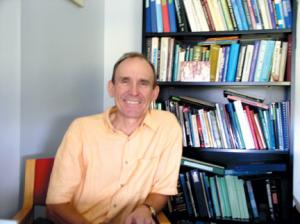David Kirchman is an expert in the field of marine microbiology. He’s also one of the University of Delaware’s top teacher-scholars and has the Francis Alison Distinguished Faculty Award to prove it.
“The Francis Alison award is the highest award the university offers to its own faculty,” said Nancy Targett, Dean of the University of Delaware College of Earth, Ocean and Environment. Francis Allison was a teacher and mentor, committed to learning, to mentoring students and to the community, she said.
Kirchman, who earned a doctorate in environmental engineering from Harvard University, was doing post-graduate work at the University of Georgia when he saw an opening at the University of Delaware. “I just applied when I saw the ad. It looked like a good opportunity, even though I didn’t know where Delaware was,” he said.
Originally from De Pere, Wisconsin, Kirchman said he’d grown up in a small town and didn’t want to end up in another one.
“I always thought I’d come here and move on,” he said. He moved to Lewes in 1986 and the town has grown on him. “It’s a very unique small town with an interesting group of people,” he said.
When he’s not at work, Kirchman keeps busy bicycling and playing golf and basketball. “One reason I haven’t left is the university and college have been great places to work. I always felt very welcome here and very supported,” said Kirchman. He returns that welcoming vibe to his students, with an inviting demeanor and warm smile.
Kirchman’s work involves studying microbes as they degrade organic materials into carbon dioxide and inorganic nutrients. The bacteria are a big part of the carbon cycle, he said.
His research has taken him to far-flung parts of the planet – the northern and equatorial Pacific Ocean, the Southern Pacific Ocean, North Atlantic and Arctic Ocean – and he’s done work locally.
“Both poles are fascinating. Antarctica is an otherworldly type of place. The scenery is spectacular,” Kirchman said. In other places, Kirchman said, it’s just a lot of water. “We went from Hawaii to Tahiti, across six weeks of ocean. It was warm, but it looked like water,” he said with a smile.
Kirchman studies bacteria that affect changes in carbon dioxide differently at the poles than they do in the other oceans. “The traditional explanation is the temperature is colder. That’s part of the story, but it’s more complicated than that,” he said.
Kirchman is currently working in Delaware, to see how bacteria use light to function.
Kirchman has teamed up with scientists from other universities, graduate students and graduates doing post-graduate research. He is collaborating with a team of scientists in Antarctica.
“I really like the freedom of being able to figure out what I should be doing. My main responsibility is to do research,” he said. Conducting research often means teaming up closely with graduate students, said Kirchman. Targett said his former students have praised him as a mentor and devoted scientist.
As a child, Kirchman said he liked water and ecology. In college, he studied at Woods Hole Oceanographic Institute in Massachussetts and took a course there that exposed him to some of the questions experts were trying to answer. “I felt I could make a contribution,” he said.
Kirchman exemplifies Alison’s spirit, Targett said. “He’s one of the best among a field of outstanding scholars,” she said, noting Kirchman joins other College of Earth, Ocean and Environment professors who have won the Francis Alison award. “He’s probably one of the best in the world in marine microbiology. That’s not an overstatement,” Targett said. It’s reflected in letters from his peers who applaud his work and from the students he’s mentored. His book is one of the go-to books on marine microbiology, she said.
“He’s really shaped the field,”




















































